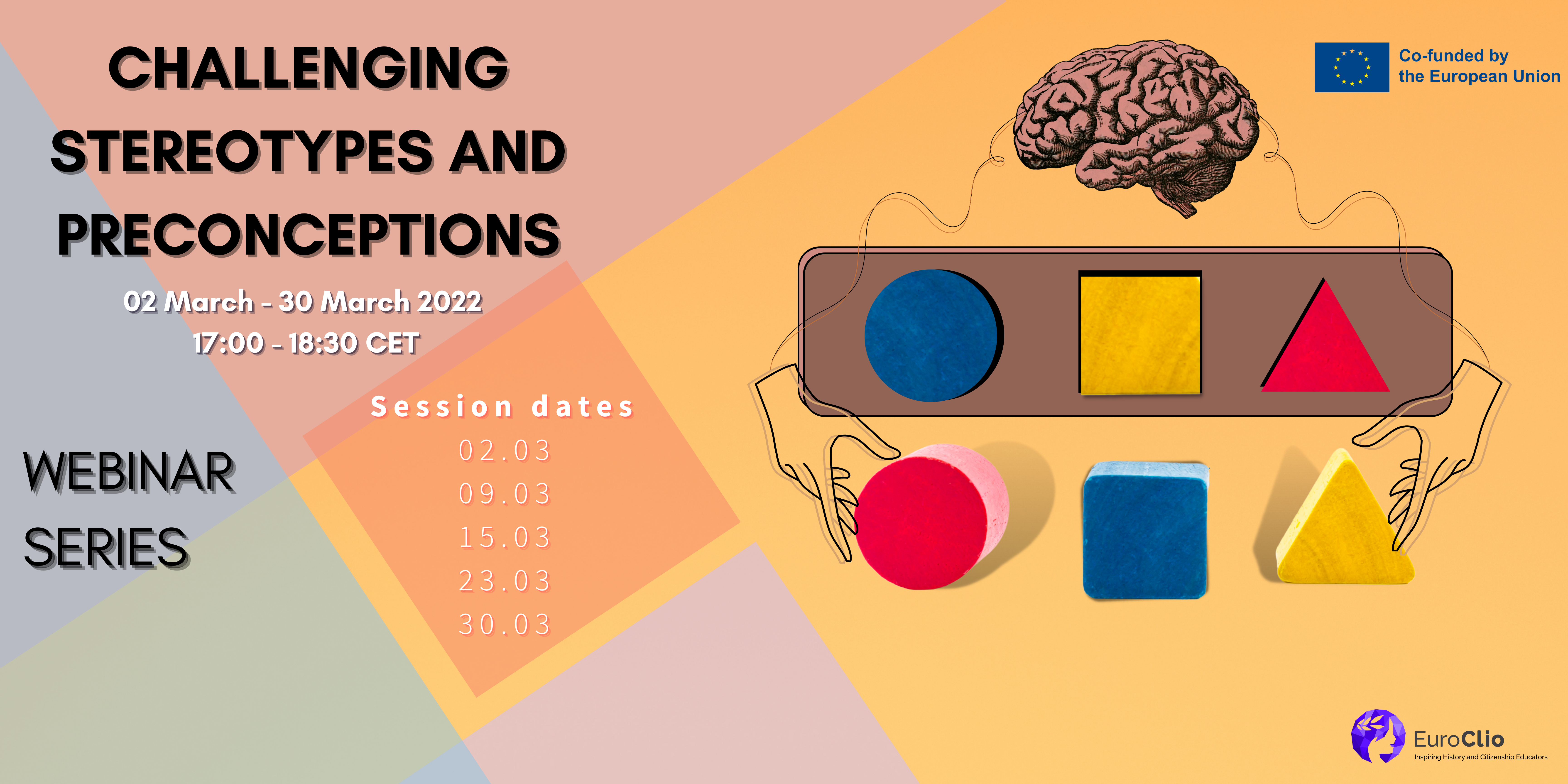

Challenging Stereotypes and Preconceptions – Webinar Series
March 30, 2022 @ 5:00 pm - 6:30 pm
About the webinar series:
EuroClio, the European Association of History Educators, is an international Non-governmental organisation that promotes the development of responsible and innovative history, citizenship, and heritage education by promoting critical thinking, multiperspectivity, mutual respect, and inclusion.
Such practices can be used also in other cases as the development of critical thinking among the students as well as promoting mutual respect and tolerance towards different cultures, religion, ethnicities etc. not only in the classroom but out of school as well.
- Keynote lecture: Stereotypes and implicit bias in education – 02 march 2022, hosted by Dr. Loes Meeussen
- The Pink Triangle – History and Memory of LGBTQ+ in European Culture – 09 march 2022, hosted by Mickaël Bertrand
- Stereotypes and Prejudices in Learning History – 23 March, hosted by Marko Šuica.
- THINK, FEEL AND CARE – challenging stereotypes in the history class – 30 March, hosted by Emma Abbate.
Dr. Loes Meeussen is a senior researcher at the Center for Social and Cultural Psychology at the University of Leuven, Belgium; Lector in Applied Psychology at Thomas More Antwerp, Belgium; and member of the Young Academy in Belgium. In her research, she studies inequality from a social psychological perspective: inequalities in culturally diverse schools and organizations on the one hand, and gender inequality in work and family roles on the other hand. How do people cope with stereotypes that exits about their group? And what characterizes inclusive contexts in which everyone can function optimally?
The first active workshop is hosted by Mickaël Bertrand: Pink Triangle – History and Memory of LGBTQ+ in European Culture.
Most of the time, when students hear about LGBTQ+ at school, it is to talk about persecution and bullying. In this workshop, participants are invited to consider the way we can teach how LGBTQ+ people have gained recognition and finally proved that they are not only victims but also heroes of European culture. During this session, participants receive a list of documents which can be used in History, Civics, English, Arts, Cinema and also Sciences. They are also invited to test an “Hexagon Game Activity” that they can then adapt in their lessons.
Mickaël Bertrand is a history, geography and civics teacher in the Académie de Dijon (France) and a Trainer and author of education resources.
On the 15 March, a networking session takes place. The focus lies on interactive discussions where participants will have the possibility to reflect on and share the experiences they had and tools acquired in school, exploring potential strategies to tackle stereotypes and preconceptions in the classroom.
This session will be hosted by EuroClio secretariat staff.
The second active workshop is hosted by Marko Šuica: Stereotypes and Prejudices in Learning History. This workshop focuses on teaching strategies and lesson plans that can be used to challenge stereotypes and preconceptions. Questions about stereotypes as a regular occurrence in everyday life, distinctions between “positive” and “negative” stereotypes and their relation to the classroom are tackled in this session.
Marko Šuica is a Professor of history and lectures in History at the University of Belgrade. His specialty is medieval Balkan history, history didactics, curricula design and assessment. He is active in educational projects and teacher training on national, regional and international level. He is the author of several textbooks, additional teaching materials, education standards and history curricula. He is also a consultant on Council of Europe anti-discrimination and national minorities programs, member and project advisor of EuroClio and the International Society for History Didactics.
The webinar series will conclude with the session THINK, FEEL AND CARE – challenging stereotypes in the history class – hosted by Emma Abbate. This workshop will expose participants to hands-on examples of how teachers can analyze prejudices and stereotypes in history class. Forms of racism with grave consequences will be explored during the workshop, in order to give teachers the tools to explain how mechanisms of discrimination and exclusion work and how they can be deconstructed.
This workshop offers step-by-step techniques teachers can use to increase students’ awareness of how the pyramid of hate is generated from biased ideas. It will include a discussion of ways teachers can assist students in developing skills to recognize and challenge preconceptions and injustices while studying syllabus contents. The seminar will draw on Harvard Project Zero’s Thinking Routine “Think, Feel, Care”, an approach to visual history that allows looking closely at pictures or other documents during the lesson.
A discussion of helpful internet sources to implement the topic from Europeana and other databases (Pilecki and Arolsen digital Archives) will also be included, together with a bibliography of Council of Europe’s educational toolkits ideated to end stereotypes.
Emma Abbate is a teacher of Latin, History, and Geography in English since 1998/9, expert in CLIL (Content and Language Integrated Learning) methodology and Cultural & Linguistic Mediation, with a Ph.D. in History (University Federico II, Naples). She teaches in the Cambridge International IGCSE® High School Armando Diaz (Caserta), she is author of digital content and free-lance researcher.Emma cooperates with the University of Naples L’ Orientale as a CLIL teachers’ trainer, she gained specific expertise in Erasmus+ project management as coordinator of several projects funded by the EU.
Participation to the webinar series is free for EuroClio members.
The participation fee is 30EUR for the full series.
Not a member yet? Join here!
